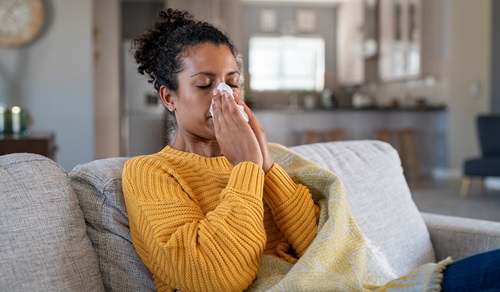
“It’s really important to pay attention to our health this time of year,” said Jacqueline Joe, MD, a board-certified internal medicine specialist and primary care physician with Memorial Hermann Medical Group (MHMG). “In addition to staying up-to-date with annual physicals and recommended health screenings, flu vaccines and COVID-19 boosters should be considered to help prevent serious illness from these highly contagious illnesses.”
Flu Prevention
Flu season peaks in the United States between December and February, so the U.S. Centers for Disease Control and Prevention (CDC) recommends that most people, ages 6 months and older, receive an influenza vaccine each year before the end of October. This allows the vaccine to fully prepare the immune system for exposure during those peak months.
In June, the CDC endorsed a recommendation to administer the higher-dose recombinant vaccine or adjuvanted vaccine for adults, 65 years and older, as recent studies show these formulas work better than standard-dose unadjuvanted vaccines for individuals in this age group. The recommended vaccines are Fluzone High-Dose Quadrivalent vaccine, Flublok Quadrivalent recombinant flu vaccine and Fluad Quadrivalent adjuvanted flu vaccine. The CDC also encourages people in this age group to get a regular flu vaccine if the higher-dose versions are unavailable when they get their flu shot.
“As we’ve seen with COVID-19, older people have weaker immune systems and experience more severe illness, with a higher risk of hospitalization and death, when they are exposed to the influenza virus and the coronavirus,” Dr. Joe said. “This updated recommendation aims to protect these older Americans.”
Dr. Joe acknowledges the vaccination fatigue plaguing America, but she warns that refusing to receive a flu shot this year sets the stage for an increased number of flu cases. Without protection from the flu vaccine, these cases will likely be more severe, even deadly. Moreover, she says, with an expected resurgence of highly contagious strains of COVID-19, doctors and public health officials worry about the potential of a “twindemic,” which could strain hospitals as happened with COVID-19 in 2020.
Annual Physicals
Dr. Joe advises people to schedule their annual physicals if they have not yet visited a primary care physician this year.
“I like to encourage patients to schedule their annual appointments around their birthdays, so they remember each year,” she said. “Call the office a few months before your birthday each year to schedule your appointment around your birthday.”
The regularity of an annual appointment helps patients stay on track with their health and provides an opportunity for them to flag any concerns with their primary care physician. From Dr. Joe’s perspective, annual appointments allow her to recognize changes in her patients’ physical and mental health, promote rapport between patients and her, and allow her to educate patients about disease prevention, early detection and recommended screenings.
“We thoroughly examine patients at their annual physicals,” Dr. Joe said. “We perform lab tests and record health data such as their weight, blood pressure, heart rate and oxygen levels. We also examine their skin, eyes, mouth, ears, lungs and belly and discuss their risk factors and family medical history.”
Health Screenings
Dr. Joe also discusses recommended health screenings. Most screenings schedules are based on age and gender and factor in personal and family health history.
Women
Beginning at age 21, women with an average risk for cervical cancer should have a Pap test every three years, according to the United States Preventive Services Task Force (USPSTF). Beginning at age 30, these women should have an HPV (human papillomavirus) and Pap co-test every five years. Women with an average risk of breast cancer should get yearly mammograms beginning at age 40. Post-menopausal women should also have a bone density scan at age 65 to determine their risk of osteoporosis.
Men
The USPSTF recommends men with average risk for prostate cancer get tested at age 55. This screening checks the amount of PSA, or prostate-specific antigen, in the blood. High levels of this protein may indicate prostate cancer. At age 65, men should also be screened for an abdominal aortic aneurysm, which can rupture the aorta and cause serious complications and death.
Colon Cancer
Men and women with average risk for colon cancer should have a colonoscopy at age 45 to check for polyps. At-home stool collection kits that detect blood in the stool, which may indicate colon cancer, are also available, but require a follow-up colonoscopy if abnormalities are found.
Lung Cancer
Men and women who have smoked the equivalent of 20 “pack years” (i.e., one pack of cigarettes a day for 20 years or two packs of cigarettes a day for 10 years) should have a low-dose CT lung cancer screening, beginning at age 50.
Dr. Joe says that these screenings may be necessary at younger ages if a person’s mother, father or sibling was diagnosed with cancer earlier than the recommended screening age. “If a person’s mother was diagnosed with colon cancer at age 45, for example, we’d recommend that patient have a colonoscopy at age 35,” she said.
Dr. Joe advises her own friends and family members to partner with a primary care physician to optimize their health. “As a primary care physician, I help patients take the guesswork out of staying healthy,” she said. “Prevention of and early detection of illness and disease are key to achieving and maintaining good health. An annual physical exam with your primary care physician allows you to effectively manage your health by getting vaccinations, setting up recommended screenings and discussing any concerns or changes in your health that may need further evaluation.”
Download a guide to recommended vaccines and health screenings here. Click here to find a primary care physician.